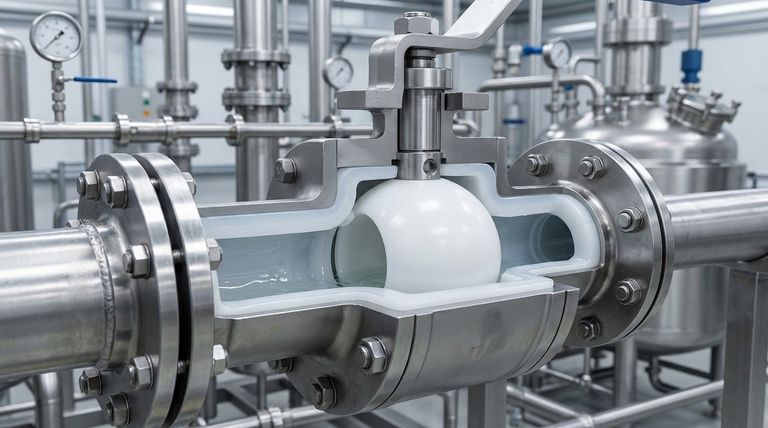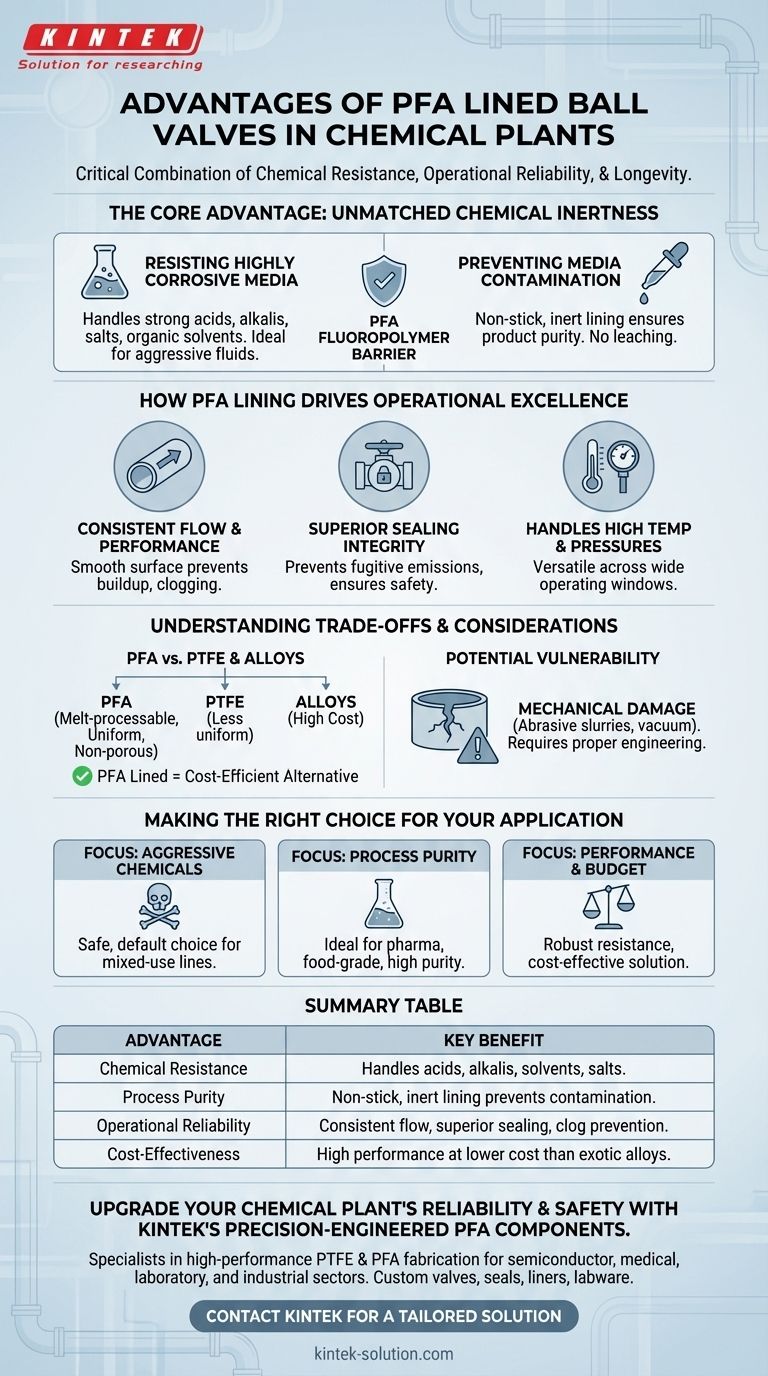In chemical plant operations, PFA lined ball valves provide a critical combination of superior chemical resistance, operational reliability, and enhanced longevity. The valve's core structure is protected by a thick Perfluoroalkoxy (PFA) lining, creating an inert, non-stick barrier against aggressive and high-purity media. This design prevents corrosion, minimizes contamination, and ensures consistent performance in demanding environments.
The decision to use PFA lined ball valves is not just about resisting corrosion. It's a strategic choice to minimize operational risk, reduce the total cost of ownership, and ensure process integrity in environments where material failure can lead to catastrophic consequences.

The Core Advantage: Unmatched Chemical Inertness
PFA is a type of fluoropolymer, a class of materials renowned for their extreme resistance to chemical attack. This property is the primary reason for its selection in critical applications.
Resisting Highly Corrosive Media
The PFA lining is virtually immune to a vast range of chemicals. It reliably handles everything from strong acids and alkalis to salts and organic solvents, which would quickly destroy standard metal valves.
This makes PFA lined valves an ideal solution for services where the process fluid is highly aggressive or its composition changes over time.
Preventing Media Contamination
Because the PFA lining is extremely inert, it does not leach or react with the process fluid. This is crucial for applications where product purity is paramount, such as in the pharmaceutical, semiconductor, or specialty chemical industries.
The valve becomes a neutral component in the piping system, safeguarding the quality of the end product.
How PFA Lining Drives Operational Excellence
The benefits of PFA extend beyond simple corrosion resistance. The physical properties of the lining directly contribute to a more efficient and reliable plant operation.
Ensuring Consistent Flow and Performance
The surface of a PFA lining is exceptionally smooth and non-stick. This characteristic prevents process media, especially slurries or crystallizing fluids, from building up inside the valve.
This lack of deposit formation ensures a consistent flow rate, predictable valve operation, and reduces the risk of clogging or blockages.
Superior Sealing Integrity
PFA lined ball valves are engineered to provide tight, reliable seals. This is essential for preventing fugitive emissions of hazardous, toxic, or valuable materials, which is a top priority for plant safety, environmental compliance, and economic efficiency.
Handling High Temperatures and Pressures
These valves are designed to perform reliably across a wide operational window. They can handle the high temperatures and pressures common in many chemical reactions and transfer processes, making them a versatile choice for numerous applications within a single facility.
Understanding the Trade-offs and Considerations
While highly effective, PFA lined valves are not a universal solution. Understanding their context and limitations is key to proper specification.
PFA vs. PTFE Linings
PFA is very similar to the more commonly known PTFE (polytetrafluoroethylene). The key difference is that PFA is melt-processable, allowing it to be injection molded into a more uniform, non-porous lining. This can offer advantages in certain high-stress or high-purity applications compared to some methods of lining with PTFE.
Lined Valves vs. Exotic Alloy Valves
The primary alternative to a lined valve is a valve constructed entirely from a corrosion-resistant exotic alloy, such as Hastelloy or Titanium. While alloy valves may offer superior performance at extreme temperatures or pressures, they come at a significantly higher cost.
PFA lined valves provide a highly effective, cost-efficient alternative that meets the performance requirements for a vast majority of corrosive chemical services.
Potential for Liner Damage
The primary vulnerability of a lined valve is mechanical damage to the liner. Abrasive slurries, improper valve actuation, or exposure to vacuum conditions beyond the valve's rating can potentially damage the lining and compromise its protective barrier. Proper engineering and operational awareness are crucial.
Making the Right Choice for Your Application
Selecting the right valve requires matching its strengths to your primary operational goal.
- If your primary focus is handling a wide range of aggressive chemicals: PFA's broad chemical resistance makes it a safe, default choice for mixed-use lines or services with highly corrosive media.
- If your primary focus is process purity and preventing contamination: The smooth, inert, and non-stick surface of PFA is ideal for pharmaceutical, food-grade, or high-purity chemical applications.
- If your primary focus is balancing performance and budget: PFA lined valves deliver robust chemical resistance that is often more than sufficient, providing a cost-effective solution compared to expensive exotic alloy valves.
Ultimately, specifying PFA lined ball valves is a proactive investment in the long-term safety, reliability, and efficiency of your chemical processing operations.
Summary Table:
| Advantage | Key Benefit |
|---|---|
| Chemical Resistance | Handles strong acids, alkalis, solvents, and salts. |
| Process Purity | Non-stick, inert lining prevents media contamination. |
| Operational Reliability | Consistent flow, superior sealing, and clog prevention. |
| Cost-Effectiveness | High performance at a lower cost than exotic alloys. |
Upgrade your chemical plant's reliability and safety with KINTEK's precision-engineered PFA components.
As specialists in high-performance PTFE and PFA fabrication for the semiconductor, medical, laboratory, and industrial sectors, we understand the critical need for valves and components that withstand aggressive media while ensuring purity.
Whether you need custom PFA-lined ball valves, seals, liners, or labware—from prototypes to high-volume orders—our commitment to precision production ensures your systems operate with integrity.
Contact KINTEK today to discuss your specific application and receive a tailored solution that reduces operational risk and total cost of ownership.
Visual Guide

Related Products
- Custom PTFE Teflon Balls for Advanced Industrial Applications
- Custom PTFE Square Trays for Industrial and Laboratory Use
- Custom PTFE Measuring Cylinders for Advanced Scientific and Industrial Applications
- Customizable PTFE Seals Filter Holders for Versatile Applications
- Custom PTFE Parts Manufacturer for Teflon Parts and PTFE Tweezers
People Also Ask
- What are the tolerances for PTFE balls based on size? Precision vs. Standard Grade Explained
- What size range do PTFE balls come in? A Guide from 3mm to 100mm
- What are PTFE balls made of and what are their key properties? Unlock Superior Chemical & Thermal Performance
- What are the key features of Teflon balls? Unlock Superior Performance in Demanding Environments
- What are the common applications of PTFE balls? Leverage Unmatched Chemical Resistance & Low Friction



















